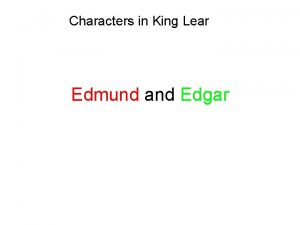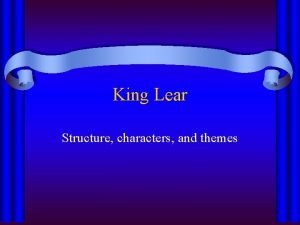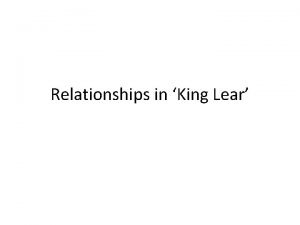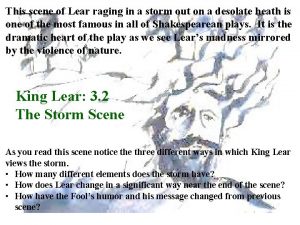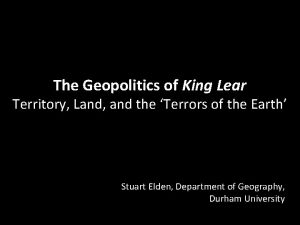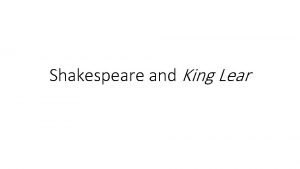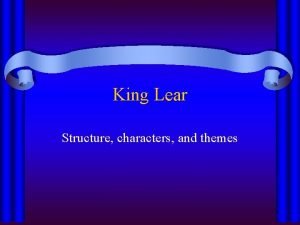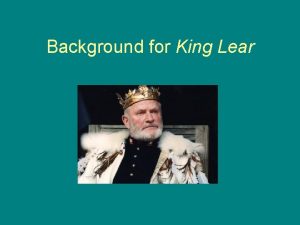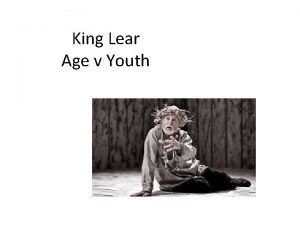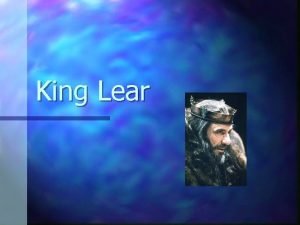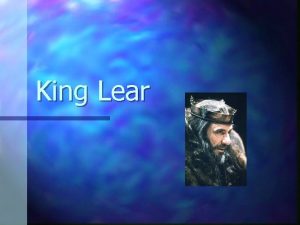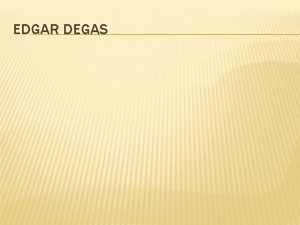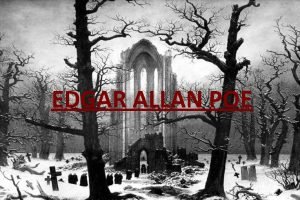Characters in King Lear Edmund and Edgar Edmund











- Slides: 11

Characters in King Lear Edmund and Edgar

Edmund – the basics • Edmund is the illegitimate, short-sighted, son of the Earl of Gloucester. • Edmund resents his illegitimate status, which can be seen as the motivation for each of his actions. • Due also to primogeniture, Edmund will inherit nothing from his father. • He later becomes involved with both Goneril and Regan, and attempts to play them both against one another.

Edgar – the basics • Edgar is going to inherit the title as Earl of Gloucester as he is Gloucester’s legitimate son. • We feel sorry for Edgar as he is decieved from the very beginning of the play by his brother Edmund. • However, Edgar regains strength towards the end, as he comes to know of Edmund’s disloyalty and he thus challenges to a duel (which Edgar subsequently wins) • We then feel sorry for Edgar at the very end, as Gloucester’s revelations that poor Tom is his own son Edgar, kills him. • In the end Edgar is one of the only two characters left, himself and Albany, to be crowned King.

Sub plot reflects the main plot? • The subplot of Edmund, Edgar, and Goneril can be seen to reflect the main plot of Lear and his daughters. For example, Edmund acts out for many of the same reasons as Goneril and Regan, and eventually directly ties them together in his later affairs with them.

Beginning What happens? • The audience initially feels sorry for Edmund as the play begins with Gloucester describing Edmund’s illegitimacy to Kent through the use of coarse jokes QUOTE. He rejects the laws of the state and society as he consistently feels like an outcast due to his ‘baseness’. • Goes against the natural order of things – shown in his soliloquy when he confronts his ‘baseness’ and declares ‘Nature’ is his goddess QUOTE, despite everything about what he wants – his father’s title, and money – being unnatural (not first born, not legitimate). What does this show about the character? • This is the introduction of the main flaw in the character of Edmund. His resentment of his own illegitimacy is his main motivation for all of his actions. Though he strives to have things which we could say anybody would want – i. e. his father’s title, money, and land, it is the means by which he sets out to acquire these things that helps us to recognise that his illegitimacy is what transforms him into the (first) villain of the play. What themes does this link him to? • The lack of morals that Edmund seems to possess, shown in the disloyalty towards both his brother and his father, links him directly to themes of deception, filial ingratitude, and perhaps also madness. However, his rejection of his ‘baseness’ links him directly to theme of nature as is shown in his main soliloquy: QUOTE

Beginning What happens? • Edgar is disinherited by Gloucester QUOTE as his brother Edmund sets him up. He is declared by his father as an outlaw. • He disguises himself as the beggar QUOTE – poor Tom o’ Bedlam, a madman. What does this show about the character? • Edgar is not cruel in nature. His trust for his brother is shown when he immediately believes what Edmund tells him about Gloucester. QUOTE What themes does this link him to? • Edgar’s disguise of poor tom links him to two main themes in the play. The first is theme of sight, as we later see, many of the characters who actually know Edgar (Lear, Gloucester, Edmund) are decieved simply by a change of voice and character QUOTE. This shows us that many of the characters in King Lear, only understand what they see with their own eyes. • The second theme is that of madness. The character of the beggar poor tom, that Edgar takes on, is a mad character. Poor tom’s mad ramblings can be heard at several important stages in the play – i. e. when Lear denounces his own daughters QUOTE, and when he meets Gloucester on the heath. This emphasises the distinction between madness and sanity QUOTE.

Middle What happens? • Edmund betrays Gloucester to Cornwall, Regan and Goneril. This leads to Gloucester’s arrest, and his eyes being gouged out by Cornwall. Regan tells Gloucester that Edmund tricked him and turns him out onto the heath. • Edmund meanwhile plots the death of Albany, whom Edgar has warned in the meantime. What does this show about the character? What themes does this link him to?

Middle What happens? • Edgar, in the disguise of poor Tom, meets Lear out on the heath after the storm, and is there as Lear denounces his daughters • Edgar, still disguised as poor tom, meets his blind father on the heath and prevents him from killing himself, and they then go on to meet Lear, who is now completely insane. • Edgar slays Oswald who attempts to kill Gloucester, which leads him to find a letter in Oswald’s pocket, from Goneril to Edmund, suggesting the murder of Albany. What does this show about the character? What themes does this link him to?

End What happens? • It can be said that in the end Edmund tries to repent for his sins as he tries to withdraw his order for the execution of Lear and Cordelia. • His death enables him to see what he has done. • This almost repentance for what he has done can also be seen as a dramatic effect of Shakespeare’s as it shows us hope that he may get better, thus making his death more of an impact. What does this show about the character? What themes does this link him to?

End What happens? • (A masked) Edgar challenges Edmund to a duel and fatally stabs him. He then reveals himself, causing Gloucester’s death due to his own joy at the revelation. What does this show about the character? What themes does this link him to?

Do the characters encourage any particular critical interpretations?
